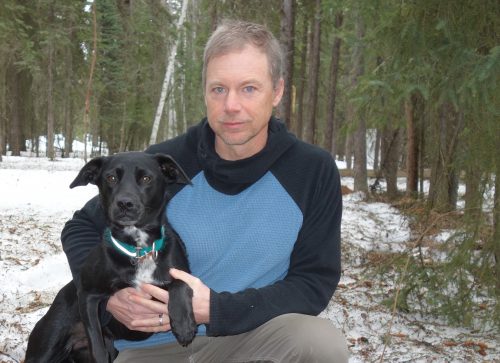New podcast highlights Alaska science and natural history
May 5, 2021
Jerald Pinson
903-767-8331
The Alaska Science Pod was created to give voice to the people tackling big scientific
questions in the country’s largest state. Through a series of monthly episodes, the
podcast will feature research stories ranging from volcanoes, earthquakes and auroras
to climate change, anthropology, paleontology and wildfires. Any natural phenomena
in Alaska and the people who study them are fair game.
Hosted by science writer Ned Rozell, the podcast is a production of the University
of Alaska Fairbanks Geophysical Institute. The first episode is available and can
be accessed on the web and on streaming services such as Spotify, Stitcher and Amazon Music. New episodes
drop the first Tuesday of every month.
Alaska science soundbites
Rozell began his writing career in the early 1990s and has written hundreds of articles
on topics that seemingly span the entirety of scientific endeavor in Alaska. He’s
taken readers to the edge of cinder cones in the Aleutian arc, astride rapidly disappearing
glaciers in the Southeast spur of the state, back in time through some of the largest
earthquakes ever recorded in U.S. history, and back further still to the last ice
age, when the Bering Strait served as a land bridge for plants, animals and people
between North America and Eurasia.
“There's so much science going on in this giant peninsula that there's never really
a shortage,” he said.

With the Alaska Science Pod, Rozell hopes to expand on these themes and more, giving voice to the people whose scientific research has helped illuminate Alaska’s natural history.
Rozell has also written about his own excursions to the far corners of the state. In early May 1997, he started walking north from Port Valdez along the trans-Alaska pipeline and kept going, accompanied by his chocolate Labrador retriever, Jane. Twenty years later, he retraced his steps — all 800 miles of them.
That same spirit of adventure will be on full display in the podcast, at times as vignettes of the people he’s met and places he’s seen, at others in the form of in-depth analyses of the flora and fauna that populate Alaska and the patterns of biodiversity across the state.
Taking to the sky
In the Alaska Science Pod’s inaugural episode, Rozell sits down with Cathy Cahill, director of the Alaska Center for Unmanned Aircraft Systems Integration, to discuss how remotely piloted aircraft are being used to propel scientific discovery to new heights.
During its 20 years in Alaska, ACUASI has undertaken remote sensing projects across North America that have included monitoring endangered whales in Canada’s busiest shipping port, providing real-time data on Alaska wildfires for ground personnel and mapping sea ice in the Arctic Ocean.
“It can be something as simple as flying over a salmon stream and counting fish or something as complex as delivering emergency medical supplies to somebody who is stranded in the middle of nowhere,” Cahill said.
To listen to the discussion and to sign up for alerts when future episodes are released, visit the Alaska Science Pod website.
ADDITIONAL CONTACT: Ned Rozell, Geophysical Institute, ned.rozell@alaska.edu


